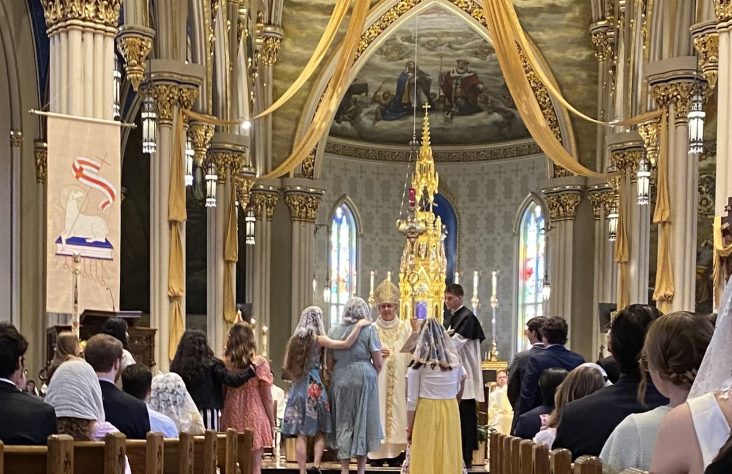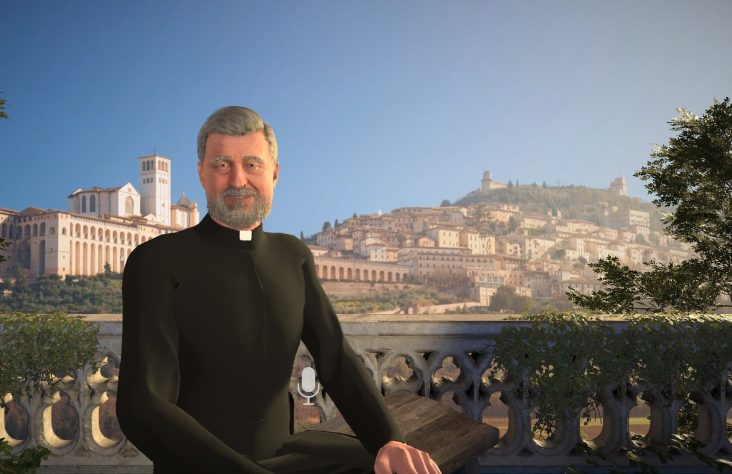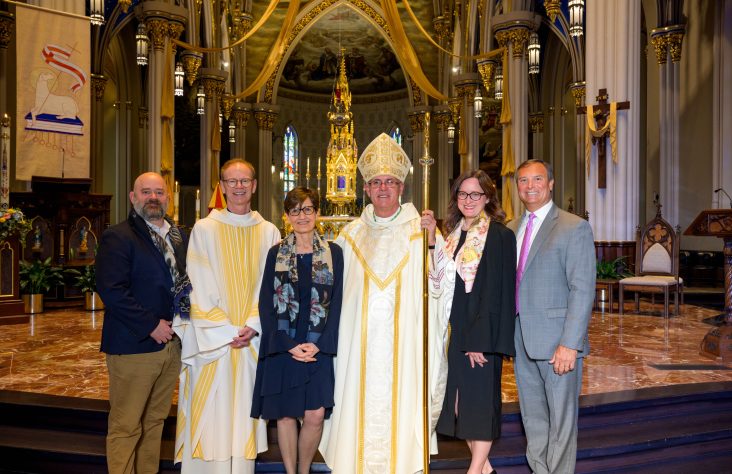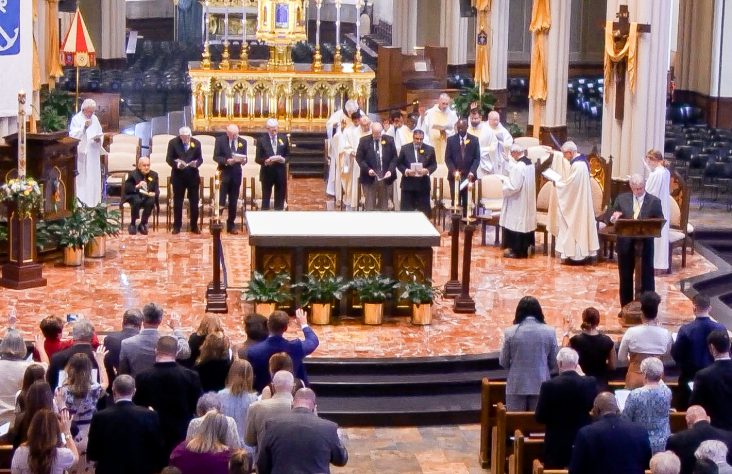November 21, 2023 // National
Synod, Eucharist Are Interconnected, Bishops Say During Fall Assembly
By Gina Christian and Peter Jesserer Smith
BALTIMORE (OSV News) – The Eucharist and synodality are interconnected, said prelates attending the U.S. Conference of Catholic Bishops’ annual fall plenary assembly, which was held from Monday, November 13, to Thursday, November 16. Synodality, they said, ensures the faithful’s communication so the Church can fulfill its Eucharistic mission.
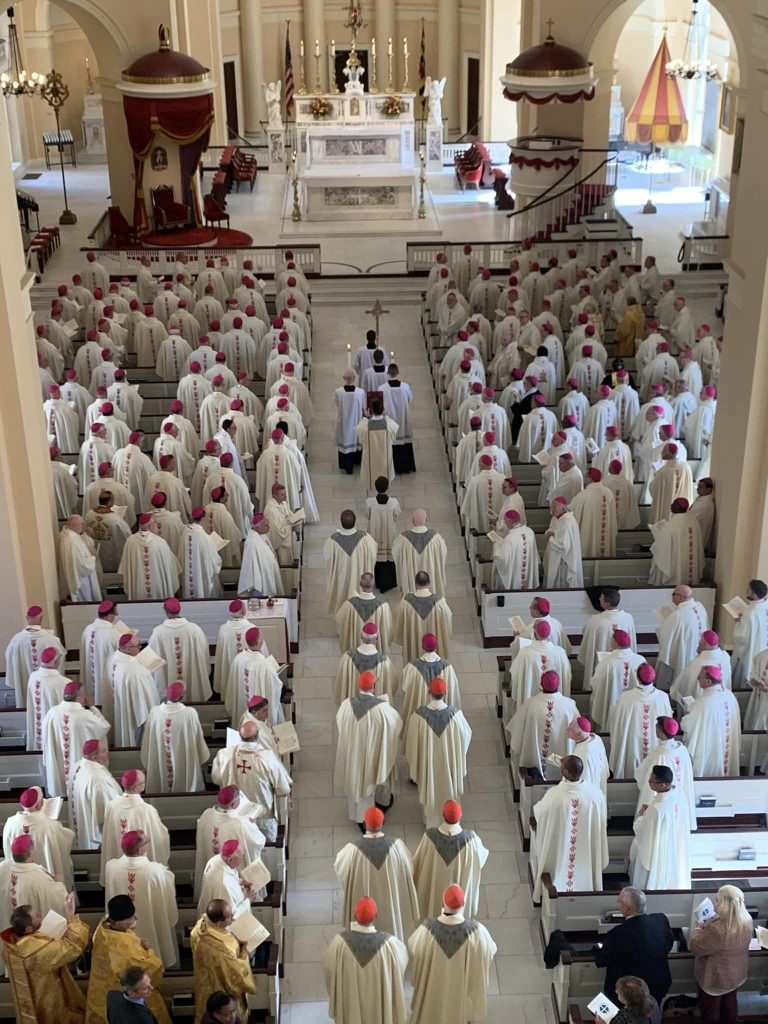
Bishops attend Mass Nov. 13, 2023, at the Basilica of the National Shrine of the Assumption of the Blessed Virgin Mary in Baltimore at the start of their 2023 fall plenary assembly. (OSV News photo/courtesy Angelus Virata, Baltimore Basilica)
The October meeting of the synod on synodality at the Vatican was a touchpoint for several bishops speaking on Tuesday, November 13, including Bishop Rhoades, who recently returned from Rome, where he participated in the Synod of Bishops. Also speaking at the U.S. bishops’ meeting in Baltimore was the conference’s president, Archbishop Timothy P. Broglio, who heads the Archdiocese for the Military Services USA, Cardinal Christophe Pierre, Apostolic Nuncio to the U.S., and Bishop Daniel E. Flores of Brownsville, Texas, who also shared his experience of the synod with the assembly.
In his welcoming address at the USCCB assembly, Cardinal Pierre said that synodality and the National Eucharistic Revival now underway in the U.S. may “at first glance” seem unrelated, but in reality “belong together by their very nature” and “shed light on one another.”
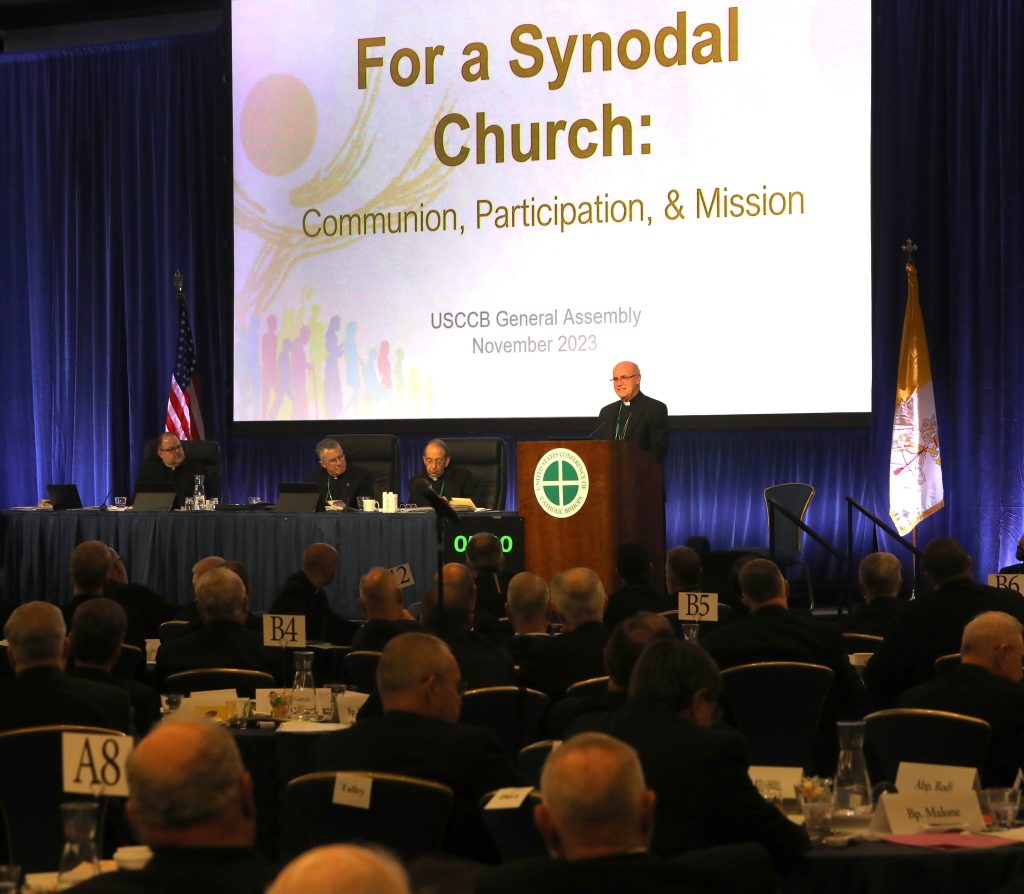
Bishop Kevin C. Rhoades of Fort Wayne-South Bend, Ind., speaks during a conversation about the Synod on Synodality in Rome at a Nov. 14, 2023, session of the fall general assembly of the U.S. Conference of Catholic Bishops in Baltimore. Also pictured are Father Michael J.K. Fuller, USCCB general secretary; Archbishop Timothy P. Broglio of the U.S. Archdiocese for the Military Services, USCCB president; and Archbishop William E. Lori of Baltimore, USCCB vice president. (OSV News photo/Bob Roller)
Speaking with reporters, Bishop Rhoades said the synod has been more than a “sharing of experience,” but also an exploration of “theological convictions.” Referring to the synod’s synthesis report released on Saturday, October 28, he said, “One of the things that’s being called for is a deeper theological reflection on some of these issues.”
Bishop Flores, who chairs the USCCB’s Committee on Doctrine and is tasked with shepherding the synodal process in the U.S., told the bishops that the synod’s method of “conversation in the Spirit” was an effective way to promote listening.
Speaking to the bishops alongside Bishop Flores, Bishop Rhoades called the synod “an experience of the beautiful universality of the Church and of our communion in faith and love for the Lord and the Church.”
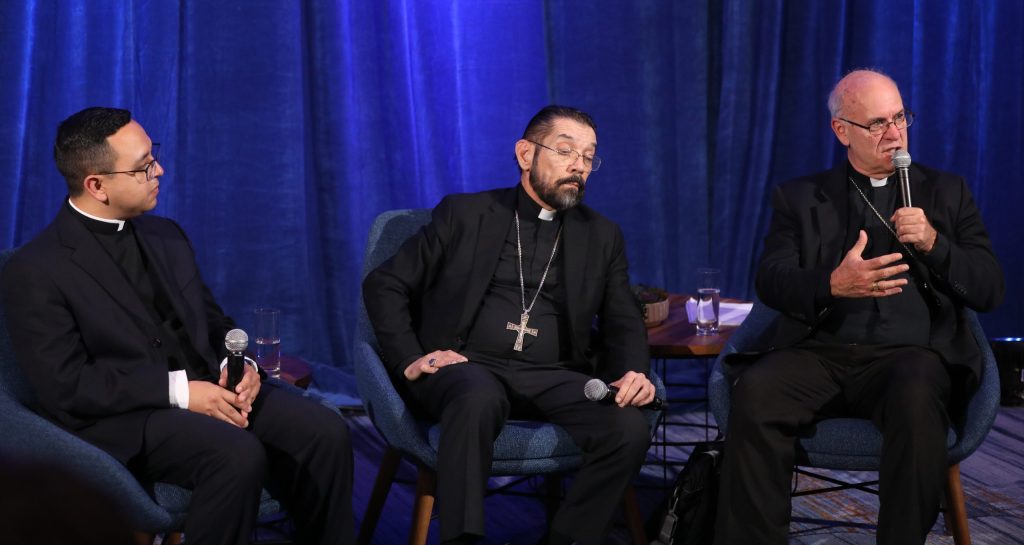
Bishop Kevin C. Rhoades of Fort Wayne-South Bend, Ind., answers a reporter’s question during a news conference Nov. 14, 2023, at the fall general assembly of the U.S. Conference of Catholic Bishops in Baltimore. Also pictured are Father Iván Montelongo, a priest of the Diocese of El Paso, Texas, and Bishop Daniel E. Flores of Brownsville, Texas. The three were asked their experiences at the Synod on Synodality, which took place in Rome Oct. 4-29. (OSV News photo/Bob Roller)
Bishop Flores said conversation “implies more than talking and listening,” and “involves sharing a way of life and a style of life” marked by “love, joy, peace, patience, kindness, generosity, faithfulness, gentleness and self-control,” the fruits of the Spirit listed in Galatians 5:22-23.
He said that experience happens at a level that is “local and particular,” but at the same time, “the particular life of the community … can bear the sacramental imprint of the whole” Church.
Archbishop Broglio told the assembled bishops that while the synod stressed “how much we can work together as parts of the Body of Christ,” he simultaneously “reflected on the many synodal realities that already exist in the Church in the United States.”
In his assembly address, Bishop Flores stressed the importance of reading and reflecting upon the synthesis document, through which “we can hear the many issues that the local churches around the world grapple with.”
“The synod offers us a Catholic way to do this grappling faithfully, realistically, prayerfully, thoughtfully, and charitably,” Bishop Flores told the assembly. “We have a lot of work to do, but we, together with our people, can be hopeful that we can do so together, because we all here especially need to be actively involved in this conversation.”
Bishops Support Call for New Doctor of the Church
The U.S. bishops voted almost unanimously (with two “no” votes) November 15 to support a request by the Catholic Bishops’ Conference of England and Wales that Pope Francis name St. John Henry Newman, the 19th-century British cardinal, a Doctor of the Church. Bishop Daniel E. Flores of Brownsville, Texas, Chair of the Doctrine Committee of the U.S. Conference of Catholic Bishops, presented the question to the body of bishops. Bishop Flores said in June the conference received a letter from Cardinal Vincent Nichols of Westminster, England, requesting “that the USCCB send a letter in support of the proposal.” With the U.S. bishops’ support, a letter will be sent to the pope.
Bishops Support Cause for Paulists Founder’s Canonization
Father Isaac Hecker (1819-88) was a Catholic convert, a religious community founder, and a pioneering Catholic publisher. He also may one day be recognized as a Catholic saint. The U.S. bishops voted on Tuesday, November 14, to support his cause for canonization, which was initiated by the Paulists Fathers – the order Father Hecker founded – and launched in 2008 by the Archdiocese of New York. As a young man, Hecker began to explore the spiritual life and reflect on the relationship between religion and democracy, living for a time in Transcendentalist utopian communities. That search would eventually lead him to the Catholic Church at age 24. He was ordained for the Redemporist congregation in 1849 and sent to America to give missions. Nine years later, he left the Redemporists and founded the Missionary Society of St. Paul the Apostle, better known as the Paulists, to evangelize in America.
Bishops Vote on New Conference Leaders
On Tuesday, November 14, the U.S. bishops elected Archbishop Paul S. Coakley of Oklahoma City as Secretary-Elect of the U.S. Conference of Catholic Bishops. They also elected Chairmen-Elect for six standing committees: Catholic Education: Bishop David M. O’Connell of Trenton, New Jersey; Communications: Bishop William D. Byrne of Springfield, Massachusetts; Cultural Diversity in the Church: Bishop Robert J. Brennan of Brooklyn, New York; Doctrine: Auxiliary Bishop James Massa of Brooklyn; National Collections: Bishop Daniel H. Mueggenborg of Reno, Nevada; and Pro-Life Activities: Bishop Daniel E. Thomas of Toledo, Ohio. Archbishop Coakley will serve one year as “elect,” and the chairmen-elect also will each serve for one year as “elect” before they each begin a three-year term in their respective positions at the conclusion of the fall plenary assembly in 2024, when the current committee chairmen complete their three-year term.Conference Grapples with Understanding Human Personhood
The best news. Delivered to your inbox.
Subscribe to our mailing list today.

